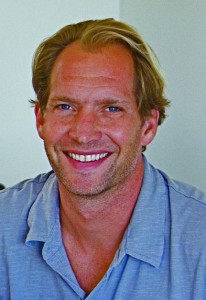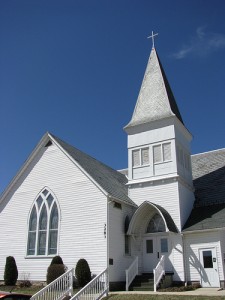wheaton college
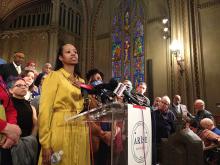
Wheaton College professor Larycia Hawkins says she is “flummoxed and flabbergasted” by the evangelical flagship’s decision to begin dismissal proceedings against her for expressing the belief that Muslims and Christians worship the same God.
Speaking at a press conference in the sanctuary of Chicago’s First United Methodist Church on Jan. 6, Hawkins reiterated that she has not wavered from the college’s statement of faith.
“Wheaton College cannot scare me into walking away from the truth (that) all humans — Muslims, the vulnerable, the oppressed of any ilk — are all my sisters and brothers, and I am called by Jesus to walk with them,” she said.
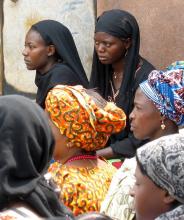
Maybe, as my alma mater Wheaton College would contend, it really is about doctrinal precision. Maybe for the sake of intellectual and spiritual integrity, there is a need to parry the ontological and epistemological arguments and counter-arguments, to determine the appropriate professional future of Dr. Larycia Hawkins, who dared to say on her Facebook page on Dec. 10 that Christians and Muslims “worship the same God.” But these issues look and feel differently in a place like Jos, Nigeria — where I was born to American missionary parents, six thousand miles from Wheaton’s campus chapel.
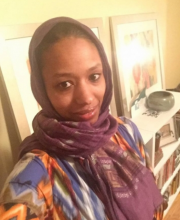
Dr. Larycia Hawkins, the Wheaton College professor suspended this week for public comments suggesting Muslims and Christians worship the "same god," released a statement Dec. 17 elaborating her position and her remarks to the press on Dec 16. The full text of her statement is below. The college also released a statement explaining its actions on Dec. 16, and can be read here.
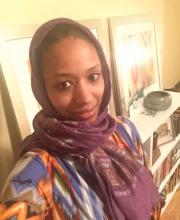
Wheaton College in Illinois announced on Tuesday that they had put Hawkins on administrative leave for her “same God” comments. In an official statement, college administrators expressed concern over the “theological implications” of her statements and promising a full review.
Founded in 1860, Wheaton has long been considered a fairly open-minded institution within evangelicalism. Science professors can teach evolution, government professors need not support conservative political theories, and students don’t have to worry about strict dress codes or stringent curfews like students at more fundamentalist colleges. In 2003, it eased bans on alcohol consumption and dancing.
But a string of politically charged events, culminating in Hawkins’ suspension, place Wheaton at an important crossroads. The school must now decide what kind of evangelical college they wish to be.
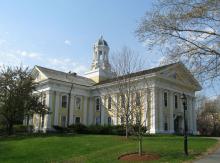
The foundation of Madeleine L’Engle, the late National Book Award-winning author of A Wrinkle in Time, has awarded OneWheaton, an independent community of LGBT students and alumni from Wheaton College, a $5,000 grant.
OneWheaton is committed to affirming LGBT students but is not officially recognized by the prominent evangelical school, which can expel students caught in homosexual behaviors.
The group plans to use the money to fund public discussions and forums about LGBT issues and evangelical culture.

I’ve always cringed when I hear someone say, “Love the sinner but hate the sin.”
In the end, I don’t quite know how to do that. I get the sentiment, and I think it basically comes from a well-intentioned place. Essentially, when someone says this, I think they’re trying to be kind and caring for the person above and beyond any kind of vice or sinful deeds that person has committed. You know: Man, I really love Steve but I hate his alcohol addiction. Deborah is a wonderful friend but her tendency to gossip is really not so wonderful. James has a heart of gold but I just can’t condone his adultery.
We love and affirm people but we don’t affirm the things they do that hurt themselves, others, or are an affront to God’s dream for them and their God-given potential.
But sin is not just the things we do (or do not do — there are both sins of commission and omission). Sin is something we can’t quite shake. While we’re first created good, as Desmond Tutu has reminded us, we certainly fall short (always be sure to remember Genesis 1:31 as the first word and Genesis 3 as the second).
Sin is a reality of our brokenness this side of Jesus’s return and that fully realized realm of God where there will be shalom and no one will hunger or cry anymore. Sin isn’t the way it’s supposed to be. So many want to make it out to be a laundry list of "don’ts" along life’s way — our faith, in the end, teaches us that it’s so much more than that.
I reject the whole notion of love the sinner but hate the sin — it misses the Gospel point that we are more than our inadequacies or things that we’ve done or not done that have missed the mark. We are better than our sin — we are created in the beautiful image of God.

On Nov. 6, Wheaton, “the Harvard of Christian colleges,” is hosting a forum on the death penalty. But it’s not just any forum. It has potential to reshape the way evangelicals in America think about the topic.
In addition to Wheaton’s own ethicist Vincent Bacote and Mercer University scholar David Gushee, the panelists include Kirk Bloodsworth, who spent eight years on death row for a crime he didn’t commit. Also on the panel is Frank Thompson, former superintendent of the Oregon State Penitentiary who witnessed executions. And finally, there is Gabriel Salguero, who heads up the National Latino Evangelical Coalition and is also a member of the National Association of Evangelicals, a Christian powerhouse representing 45,000 congregations from over 40 denominations.
This is big.
I’ll admit, part of me wished this monumental death penalty event was happening at my alma mater, Eastern University. After all, Eastern is well-known for its social justice edge, its progressive faculty — folks like Tony Campolo and Ron Sider. One Eastern alum, death penalty lawyer Bryan Stevenson, was recently called “America’s young Nelson Mandela” by Desmond Tutu and interviewed in Time magazine and The New York Times.
After I pouted a little while, I realized the significance of this forum.
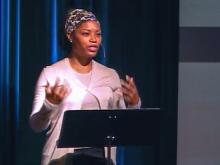
At an organization where 45 percent of U.S. senior leaders are women, Romanita Hairston’s gender is mostly a nonissue as she oversees children’s welfare programs at World Vision, the giant evangelical relief agency.
But in the larger evangelical universe, high-ranking women like Hairston remain a relative rarity.
“I think it’s kind of inappropriate at this time in history to be shocked, but I think there are places where I’m one of the few women in a position of authority or shaping theological perspective,” said Hairston, a World Vision vice president who serves on boards and teaches about gender inequity at Seattle Central Community College.

The Supreme Court offered a further sign that it favors letting employers with religious objections avoid the Obama administration’s so-called contraception mandate.
Over the vehement objection of its three female justices, the court late Thursday blocked the administration from forcing evangelical Wheaton College to sanction insurance coverage for emergency birth control, even though it would not have had to offer the coverage itself.
In doing so, the court made clear that it’s not done with the religious liberty issue following the court’s June 30 ruling that closely-held, for-profit corporations with objections to certain contraception methods do not have to offer this type of coverage to their employees.
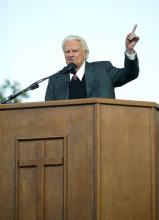
We gathered at Billy Graham’s alma mater over three days to explore his ministry’s place in American history and chronicle its meaning for the future. It was a fascinating conversation, and poignant, too, as Graham struggles with poor health at home in Montreat, N.C., far from the limelight he once commanded.
But as scholars and admirers here in suburban Chicago added to the growing conversation on Graham’s legacy, a question hovers: How many people younger than, say, 60 are listening?

Unfortunately, sexual violence on college campuses is a widespread reality. As many as 20-25 percent of women will face attempted or completed assault over the course of their college tenure. Contrary to popular myths about “stranger-danger,” 9-in-10 of those victims will know their attacker.
The first thing I did when I read the U.S. Supreme Court’s decisions in the cases involving the Defense of Marriage Act and California’s Prop 8 on Thursday morning was offer a silent prayer.
It was short — just two words — completely heartfelt and probably far more eloquent than anything I’ll manage to write in this space today.
“Thank you,” I told God.
WASHINGTON — Foes of the federal contraception mandate are cheering a Tuesday appeals court decision requiring the Obama administration to devise exemptions to the new rule for two Christian colleges.
They’re also buoyed by the D.C. Circuit Court’s reversal of lower court decisions to throw out their cases. The administration had argued that because it was crafting an exemption to the contraception rule, the cases should not go forward.
Now the cases continue, and every 60 days, the administration must report on its plan to ensure that the colleges do not have to comply with the new rule, which mandates that employers cover contraception in their health plans.
“This is a win not just for Belmont Abbey and Wheaton, but for all religious non-profits challenging the mandate,” said Kyle Duncan, general counsel of the Becket Fund for Religious Liberty, who argued the case.
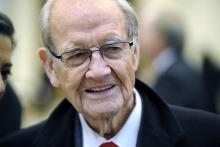
I will miss George McGovern. The former senator from South Dakota and Democratic presidential candidate in 1972 died in a hospice on Sunday, at 90, surrounded by family and friends who loved him.
Indeed, many of us did.
1972 was the first year I was old enough to vote in an election, and McGovern was the first presidential candidate for whom I voted.
To this day, I am more proud of that vote than most of the others I have cast since.
Some of McGovern’s people contacted me while I was still at seminary during the 1972 campaign. They wanted McGovern to have a chance to meet and talk with evangelical Christians, since his own Christian faith was very important to him — being the son of a Methodist minister and even having studied for a divinity degree himself for a while before deciding to go into teaching history. I agreed to help.
They couldn’t understand why most evangelicals at the time were for Richard Nixon, a man who turned out not to be one of the U.S.'s most honest, humble, or deeply religious presidents.
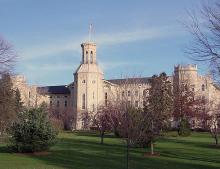
Today Wheaton College, a leading evangelical Christian school and the alma mater of the Rev. Billy Graham in Illinois, sought an injunction for "emergency relief," as it seeks to remain exempt from the Health and Human Services (HHS) insurance mandate which comes into effect today.
Filed on Wheaton's behalf by The Becket Fund for Religious Liberty, the preliminary injunction would, the college hopes, temporarily keep at bay the fines which would be levied on them under the mandate, should they fail to comply with the provisions.
The provisions, which are part of the Affordable Care Act, would require “most employer health insurance plans to provide birthday control coverage,” as was reported on God’s Politics last month. Many Catholic institutions and groups have already filed lawsuits again the mandate, and Wheaton is one of a growing number of evangelical institutions joining in the legal challenge.
DURING STEVE SLAGG’S freshman year at Wheaton College in Illinois, a gay-rights advocacy group called Soulforce announced that it was embarking on a nationwide bus tour of conservative Christian colleges that had campus policies against homosexuality to facilitate some of the first open conversations about lesbian, gay, bisexual, and transgender (LGBT) people. Wheaton College was one of their stops.
“We were talking a lot on campus about Soulforce and what we were going to do about them,” remembers Slagg about the spring 2006 tour. “It felt like nobody was really aware of the fact that there were people in this community who were gay.”
So Slagg decided to come out. He started with friends and classmates, but he also spoke with campus groups, and he held a meeting on his dormitory floor. He was interviewed in the campus paper, The Record, under the headline “Gay at Wheaton,” and numerous classmates approached him for private coffeehouse conversations around campus.
The pressure and attention grew to be too much, and Slagg quickly receded into normal campus life.
But during Slagg’s senior year, after feeling as though the conversations around homosexuality on campus had not changed, he wrote an essay for a new campus literary journal, The Pub, about being gay at Wheaton. “We exist,” he declared. “The most harmful and pervasive lie I’ve encountered at Wheaton has been that homosexual students either don’t exist at Wheaton or aren’t worth considering. Outrageously enough, I believed this lie for most of my freshman year.”
Ridiculous. Ignorant. Racist. Dangerous.
These are just a few of the terms that flew out of the Middle East this weekend following Newt Gingrich’s unwelcome remarks about Israel and the Palestinians on Friday.
As the Republican front-runner, Gingrich was speaking to the cable TV Jewish Channel and hoping to curry favor with its conservative pro-Israel constituency.
What did he do? He described the Palestinians as an “invented people” and lumped every Palestinian under the terrorist umbrella. There is no difference between Hamas and the Palestinian Authority, he said.
On Saturday night during the ABC Republican debate, Gingrich doubled-down: “They [the Palestinians] are all terrorists.”
A few of the other candidates looked, well, alarmed.
